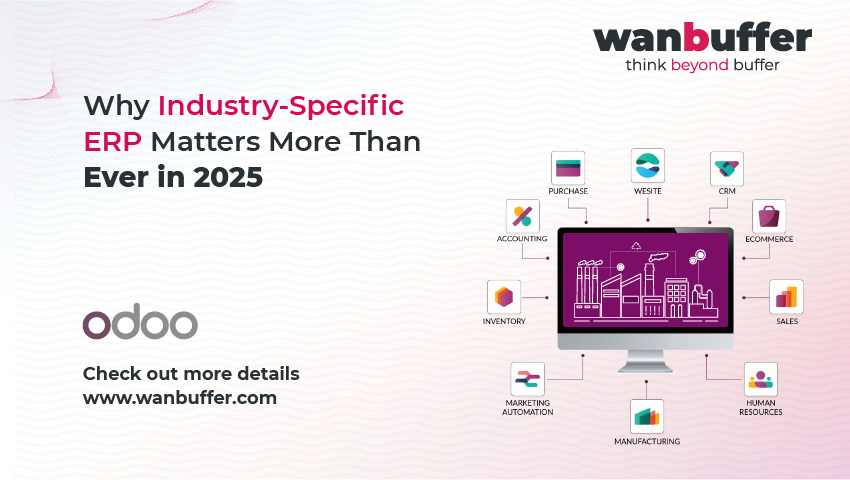
Table of Contents
Introduction
In 2025, businesses face more complexity than ever—global supply chains, evolving regulations, and shifting customer expectations. Traditional, one-size-fits-all ERP systems can no longer keep up. That’s why industry-specific ERP solutions have become essential. They’re tailored to the unique challenges and workflows of your sector, giving your organization a competitive edge.
The Evolution of ERP Systems
ERP systems have come a long way from rigid, monolithic platforms. Early ERP software provided core functions like accounting and inventory but lacked flexibility. As business needs diversified, ERP platforms evolved into modular, cloud-based solutions—eventually giving rise to industry-specific ERP options designed to meet niche demands.
What Is an Industry-Specific ERP?
An industry-specific ERP is a software solution that’s customized to the operations, terminology, and compliance requirements of a particular sector. Unlike generic ERPs, it includes:
- Pre-built workflows tailored to your industry
- Specialized modules (e.g., patient records for healthcare, or lease tracking for real estate)
- Integrated compliance standards and reporting formats
- Faster implementation and lower customization costs
This focused design translates into faster deployment and better business outcomes.
Key Advantages of Industry-Focused ERP Solutions
- Faster Implementation: With ready-made templates and pre-configured modules, go-live timelines are shorter.
- Reduced Customization Costs: Built-in features reduce the need for expensive, time-consuming custom development.
- Improved Compliance and Reporting: Meet local and global regulatory requirements more easily with industry-ready compliance tools.
- Better Workflow Efficiency: Align ERP with real operational needs, reducing data entry and manual handovers.
- Enhanced User Adoption: Employees adapt faster when the ERP uses familiar processes and terminology.
Real-World Use Cases Across Industries
Retail & eCommerce
- Multi-channel inventory synchronization
- Customer loyalty program integration
- Automated promotions and discount management
Manufacturing
- Bill of materials (BOM) tracking
- Shop floor control
- Quality management
Healthcare
- Patient appointment scheduling
- Lab result integration
- Pharmaceutical inventory control
Construction
- Project-based accounting
- Resource allocation by task and location
- On-site progress reporting
How to Choose the Right ERP for Your Industry
- Functionality: Does it offer the features your business truly needs?
- Scalability: Can it grow with your business?
- Integration: Is it compatible with your existing systems?
- Vendor Experience: Does the provider understand your industry deeply?
- Customization vs. Configuration: Look for systems that require minimal code-level changes.
Working with an ERP implementation partner like Wan Buffer Services ensures that your business gets expert guidance tailored to your industry.
The Role of Odoo in Industry-Specific ERP Adoption
Odoo is one of the leading ERP platforms known for its flexibility and modularity. Through custom-built modules and verticalized solutions, Odoo supports a wide range of industries:
- Healthcare: Hospital management, patient intake, and inventory
- Retail: POS, inventory, loyalty programs
- Real Estate: Lease contracts, maintenance, customer service
- Manufacturing: MRP, quality checks, and production planning
Its open-source foundation makes it easier to tailor workflows while keeping costs manageable.
Conclusion
In 2025 and beyond, businesses need ERP systems that go beyond general functionality. Industry-specific ERP solutions deliver targeted features, faster deployments, and better ROI. Whether you’re in healthcare, retail, manufacturing, or real estate, choosing an ERP built for your industry is not just a smart move—it’s a necessity.
Ready to explore an ERP that truly fits your business?
Connect with Wan Buffer Services and discover the power of industry-specific ERP implementation with Odoo.
FAQs
-
Q1: What’s the difference between generic and industry-specific ERP?
Generic ERP offers broad functionality for any business, while industry-specific ERP is tailored to sector-specific needs and workflows. -
Q2: Is industry-specific ERP more expensive?
Not necessarily. While initial licensing may vary, lower customization and faster deployment often reduce total cost of ownership. -
Q3: Can Odoo be customized for niche industries?
Yes! Odoo’s modular architecture and open-source nature make it ideal for building tailored ERP solutions for virtually any industry.

